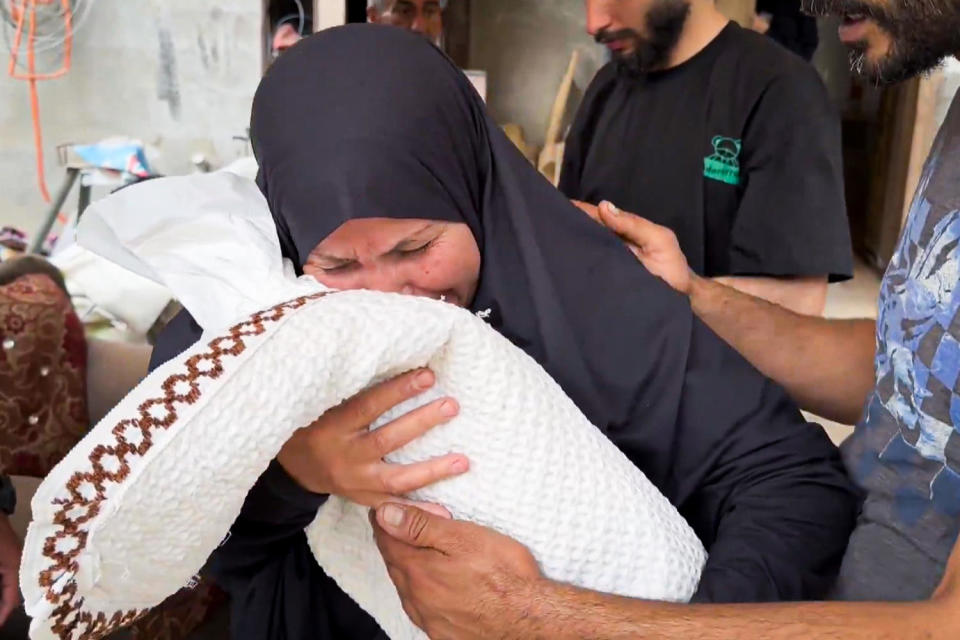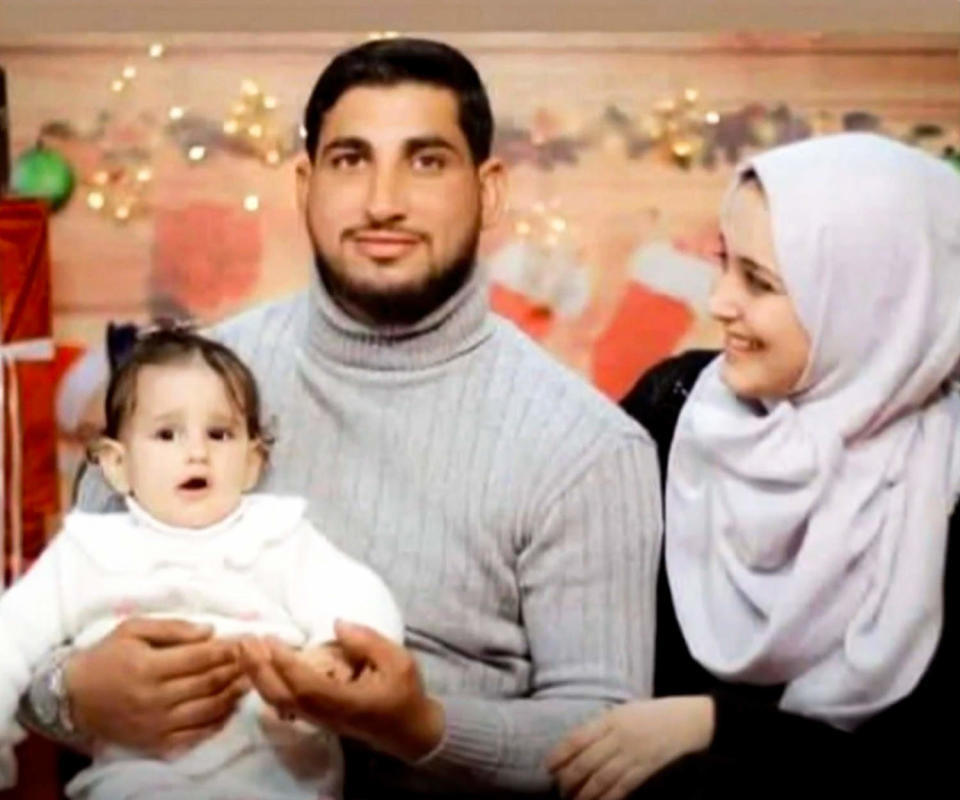Saved from her dead mother's womb, baby Sabreen was laid to rest in a mournful and sometimes angry funeral
Even for a baby, the swaddled body of Sabreen Alrouh Joudeh looked impossibly small.
Wrapped in the white burial shroud synonymous with Gaza’s colossal civilian death toll, Sabreen was placed into the dusty ground, the tiny hole matching her brief window in the world.
Last Saturday, she was pulled from the womb of her dead mother in the aftermath of an Israeli airstrike in Rafah, which also killed her father and her would-be 3-year-old sister. Doctors somehow managed to revive Sabreen — a shard of hope in their otherwise relentlessly bleak duties — but it was a fragile, ephemeral existence. And five days later her family received the call that she had died.
NBC News has followed this weeklong story of loss, hope and then back again, capturing the moment of Sabreen’s birth and the doctors’ frantic efforts to save her. On Thursday, our cameras were the only ones present at Sabreen’s funeral — a mournful and sometimes angry event.
“What did this child do? Did she blow up a tank? Did she blow up a plane? She didn’t have time to do anything,” said family cousin Ali Joudeh, 30, shouting toward the sky as he unwrapped Sabreen’s shroud to reveal her lifeless, doll-sized face. “Oh, God. She is a bird in heaven.”
This family is far from the only one devastated by this war.
The Hamas-led attack on Oct. 7 saw 1,200 killed and around another 340 kidnapped, according to Israeli officials; and Israel’s response has so far killed almost 35,000 people in Gaza, around 13,000 of them children, Gaza officials say. In Gaza, women and newborns have suffered uniquely, with some 180 births happening every day under the most horrifying of conditions, according to the United Nations.
Israel’s military campaign has come under increased criticism internationally, with even its closest ally, the United States, urging it to do more to protect civilians in its pursuit of Hamas.
Tragedy is common in these parts. But Sabreen’s story captured the imagination because, albeit fleetingly, it offered the slenderest gleam of hope amid the nightmare.

As Israel intensified aerial attacks last weekend on Rafah, the southern city where most Palestinians have fled, one airstrike hit the home where Sabreen’s family was expecting her arrival into the world in less than two months.
The blast killed her mother, Sabreen Sakani — who was 30 weeks pregnant at the time — as well as her father, Shukri Joudeh, and her 3-year-old sister she never got to meet, Malak.
Asked for comment on the strike, the Israel Defense Forces told NBC News in a statement last week, “At given times, the IDF struck several military targets of the terrorist organizations in Gaza including military compounds, launch posts and armed terrorists.”
Though the family was declared dead at the city’s Kuwaiti Hospital, doctors were able to perform a posthumous cesarean section and rescue Sabreen.
Limp, lifeless and covered in white vernix, the newborn weighed just over 3 pounds — about as much as a half-empty bag of flour. Doctors tried for more than two minutes to resuscitate her by pumping air into her mouth and tapping the tissue-paper skin stretched over her ribs.
They were finally, somehow, successful.

The medical team cautioned that her lungs were underdeveloped and her immune system was weak, warning that she would have to be kept in an incubator for up to a month if she had any chance. But her uncle Rami Joudeh, 25, got the call Thursday that his family, joined by observers internationally who were watching the story, had dreaded.
The doctor “told me that her health condition was very bad, and that she passed away,” Rami said before her burial. “I ran to the hospital. I could not bear the shocking news. It was a shock. All the members of my brother’s family are gone.”
After saying their goodbyes, the family took Sabreen to a dusty, sand-filled cemetery in Rafah, where they dug down with shovels to the grave that her family was buried in a week ago. They lifted the concrete lid of the tomb, tipped some sand inside, and laid the newborn’s body next to the others.
“Send greetings to your mother, father and sister, my love,” her grandmother Alham Al-Kurdi, 55, said through sobs as she held the slender parcel containing the newborn’s body before it was interred alongside her parents.
“I wanted to take care of her. I did not have a chance.”
This article was originally published on NBCNews.com

